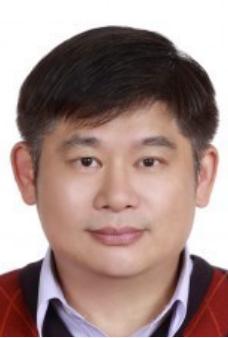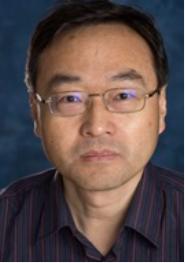
Prof. Arumugam Nallanathan
Head of Communication Systems Research (CSR) Group
Fellow IET, Fellow IEEE
Queen Mary University of London, UK
Biography: He is Professor of Wireless Communications and the Founding Head of Communication Systems Research (CSR) Group in the School of Electronic Engineering and Computer Science at Queen Mary University of London (QMUL) from September 2017. He was with the Department of Informatics at King's College London from December 2007 to August 2017, where he was Professor of Wireless Communications from April 2013 to August 2017. He was an Assistant Professor in the Department of Electrical and Computer Engineering, National University of Singapore from August 2000 to December 2007.

Distinguished Prof. Shien-Kuei Liaw
National Taiwan University of Science and Technology
Taipei, Taiwan
Biography: Shien-Kuei Liaw received the Ph.D. degree in photonics engineering from National Chiao-Tung University and the Ph.D. degree in mechanical engineering from the National Taiwan University. He joined the Chunghua Telecommunication, Taiwan, in 1993. Since 1993, he has been involving in optical communication and fiber-based technologies. He joined the Department of Electronic Engineering, National Taiwan University of Science and Technology (NTUST), in 2000. He has ever been the Director of the Optoelectronics Research Center and the Technology Transfer Center, NTUST. He was a Visiting Researcher with Bellcore (now Telcordia), USA, for six months, in 1996, and a Visiting Professor with the University of Oxford, U.K., for three months, in 2011. He has seven U.S. patents, and authored or coauthored more than 250 journal articles and international conference presentations. He has been actively contributing for numerous conferences as a technical program chair, international advisory committee, session chair, keynote speaker, and invited speaker. Dr. Liaw is a Senior Member of OSA and SPIE. He received many national honors, such as Outstanding Professor of the Chinese Institute of Electrical Engineering, in 2015; the 7th Y. Z. Hsu Scientific Paper Award, in 2009; the Best Project Award of National Science and Technology Program for Telecommunication, in 2006; the outstanding Youth Award of The Chinese Institute of Electrical Engineering; and the outstanding Youth Academic Award of the Optical Engineering Society of China. He is currently a Distinguished Professor and a Vice Chairman of the ECE Department of the National Taiwan University of Science and Technology (NTUST), a Vice President of the Optical Society (OSA) Taiwan Chapter, and a Secretary-General of the Taiwan Photonic Society. He serves as an Associate Editor of Fiber and Integrated Optics.

Prof. Changxu Wu
Tsinghua University, China
Biography: Changxu Wu (S'04–M'07) received the B.S. degree in psychology with focus on engineering and mathematical psychology from Zhejiang University, Hangzhou, China, in 1999; the M.S. degree in engineering psychology and human–computer interaction from the Chinese Academy of Sciences, Beijing, China, in 2002; and the M.S. and Ph.D. degrees in industrial and operational engineering from the University of Michigan, Ann Arbor, MI, USA, in 2004 and 2007, respectively.,Since August 2007, he has been an Associate Professor of industrial and system engineering with the University at Buffalo, State University of New York (SUNY), Buffalo, NY, USA, where he also directs the Cognitive System Laboratory. His research interests include the integration of cognitive science and engineering system design, particularly modeling human cognition systems with its applications in system design, improving transportation safety, promoting human performance in human–computer interaction, and inventing innovative sustainable and smart energy systems with human in the loop.,Dr. Wu is a member of the Human Factors and Ergonomics Society, the Society of Automobile Engineers, the Cognitive Science Society, and the American Society of Engineering Education.

Prof. Xiaodong Liu
Head of Intelligence-Driven Software Engineering Research Group
Edinburgh Napier University, UK
Biography: Prof X. Liu received his PhD in Computer Science from De Montfort University and joined Napier in 1999. He is currently leading the Software Systems research group in the SoC, Edinburgh Napier University. He was the director of Centre for Information & Software Systems. Prof Liu is an active researcher in software engineering with internationally excellent reputation and leading expertise, focusing on its emerging themes including pervasive systems (Internet of Things), Cyber-Physical Systems, services-oriented architecture, evolution of cloud services, and intelligence-driven software engineering. He has meanwhile a successful track record of teaching in a number of software engineering courses which are widely informed by his research activities.
He has led 12 externally funded projects as the PI, and published over 160 papers in established international journals and conferences, 5 book chapters and 3 research handbooks. He is the inventor of 1 patent registered in UK and USA and the founder of a spin-out company. He has been the chair, co-chair or PC member of a number of IEEE and IASTED International Conferences. He is the editorial board member of 4 international journals, associate editor for 2 international journals, and editor of 3 research books and 3 journals special issues. He is a senior member of IEEE Society and a member of British Computer Society.
